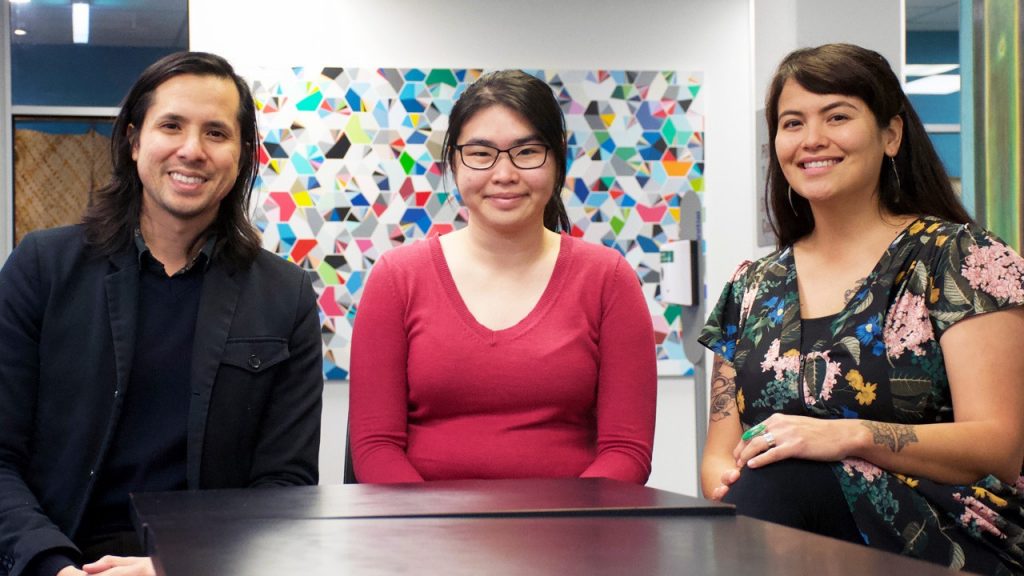
PhD in Education students Noah Romero, Evelyn Christina and Sandra Yellowhorse, Image courtesy of University of Auckland
<div class="text section">
<h2>In the midst of lockdown, a group of PhD students identified the need for a safe, inclusive place for children to share knowledge, ideas, and skills with other kids online.</h2>
<p>Education students Noah Romero, Sandra Yellowhorse and Evelyn Christina teamed up with Engineering student Syeda Wishal Bokhari and Software Engineering graduate Dr Ary Noviyanto to find a solution.</p>
<p>They came up with the idea for CircleOut, a digital platform designed to help young people to learn from each other in a safe and supportive environment, free from the pitfalls of larger platforms, such as likes, comments, and advertising. The team entered their idea in the Velocity Innovation Challenge competition, taking out the Social Innovation Prize.</p>
<p>Noah Romero says his experience with his own children played a part in the innovative concept.</p>
<p>“My children love to share the things they build, write, draw, and discover,” Noah says. “During lockdown, I noticed they found comfort and inspiration in video tutorials posted by other kids. This underscored how important it is for children to regularly see people who look like them as knowledge bearers. An important ethical consideration was that these videos should live somewhere safe where their primary purpose is to foster learning and autonomy, as opposed to generating capital.”</p>
<p>The group’s shared commitment for social and educational justice helped them to create a vision for the learning platform.</p>
<p>“Winning the Social Innovation Prize catapults our vision for social justice into realms where we have the opportunity to create significant change,” says Sandra Yellowhorse.</p>
</div>
<div class="pullquotecomponent section">
<div class="pull-quote">
<blockquote>
<p>Our vision is to convey what is possible when we rethink what education can look like, not only during the time of Covid-19, but in our changing world,&#8221; <span class="quote-author__name" style="background-color: #ffffff; color: #2b2b2b; font-size: 16px;">Sandra Yellowhorse</span><span class="quote-author__title" style="background-color: #ffffff; color: #2b2b2b; font-size: 16px;">Faculty of Education and Social Work</span></p>
</blockquote>
</div>
</div>
<div class="text section">
<p>Evelyn Christina says the highlight of the experience was the collaborative work.</p>
<p>“When things came to an abrupt halt during lockdown, we were all trying to make sense of what was happening,” says Evelyn. “ The faculty created spaces for discussion through reading groups and online classes. Those conversations become the starting point of the project as some of us become more engaged in thinking about what can be done.</p>
<p>“The most exciting part was the collaborative work with colleagues across faculties. CircleOut as of now was nothing like what any of us had initially imagined.”</p>
<p>The group is keen to bring the project to reality, if they can get the right support and resources. In the meantime, they’re cultivating the vision of CircleOut through their individual work and study at the Faculty of Education and Social Work.</p>
<p>“Our work for re-visioning futures and learning for children is a never-ending process,” Sandra says. “We are committed to re-orientating how we as educators understand learning, justice and equity, and how that can transform the lives of our children and youth.” </p>
</div>

NZEI Te Riu Roa is considering legal action against the government for the disestablishment of…
NZQA is implementing AI-marking for all Year 10 written assessments from this year onwards, following…
Teaching personal financial responsibility isn't enough. Children should be taught broader economic context, argue New…
When students can't hear the teacher, they can't learn properly. Sound quality matters in education…
The Garden City is rich with learning opportunities, no matter what subject or part of…
Teaching Council of Aotearoa launch school leaders’ stories project with Unteach Racism to challenge institutional…
This website uses cookies.